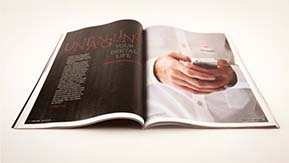The End of an Era II*: The Beginning of Another?
*Note: I’ve mentioned the print vs. digital debate in an earlier post so I promise not to cover the same ground this time around.
First off, a confession. I’m a print guy; always have been and probably always will be. From the first time I picked up a comic book as a kid to printing my own fanzine or publishing my own magazine to working on myriad projects ranging from magazines to catalogs to hardcover and softcover books for colleagues and clients alike, I just plain love the *feel* of paper and the smell of ink. I read it, collect it, enjoy it. And although I’ve seen a sea change in recent years in the industries I love, I don’t see it going away anytime soon.
But does that make me a Luddite? Hell no! I love technology, and I have more than my share of electronic toys. Where once I exclusively used a pencil or pen to create I now more often than not use a tablet or laptop or both. When I read, I’m just as likely to do it online or on a handheld device like an iPad or even an iPhone (in a pinch; my eyes aren’t what they used to be) as I am a magazine or newspaper. I haven’t forsaken my beloved print for digital, I just make use of what’s at hand and “just works” for me at any given moment. But that doesn’t mean the digital revolution hasn’t drastically changed things for magazines and books on the delivery end just as the desktop revolution changed it for creatives.
Magazines are hard
Macworld ceased publication of its print edition with the November 2014 issue, this after producing a magazine devoted to Apple’s Macintosh computer since, well, the very inception of the Mac itself. From the time Steve Jobs himself graced the cover of the first issue in 1984 to unveil his new take on the personal computer to the rise and fall (and rise again) of Apple the company and its development of revolutionary devices like the iPod, iPhone and iPad, Macworld was there to chronicle all things Apple every step of the way: Macworld, the death of print, and the digital revolution
The magazine survived even the Dark Days when it looked like Apple wouldn’t, and now it fades into the sunset as Apple continues an extraordinarily successful run as a high-profile, influential and extremely profitable company. (That the announcement came immediately after the Macworld crew returned from covering Apple’s iPhone 6 and Apple Watch announcements in Cupertino is either cruel or a final coup for those who lost their jobs in the process. But that’s another story.) Subscribers now get the digital edition in their choice of flavors, just as they had before. Except now digital is the only option. Mac|Life here in the states and several UK pubs remain the sole Mac-centric pubs left. All eyes will be on them in the coming months and years (hopefully) to see if they benefit from Macworld’s demise or follow it down the same path to oblivion.
Ironically, technology journalist Glenn Fleishman took to the “pages” of Macworld (online) to bemoan the end of his ground-breaking digital publication The Magazine in his essay How Newsstand failed The Magazine, and what Apple should do That such a beautifully written and produced digital product failed in the marketplace, regardless of the reasons (which apparently are many), speaks to the difficulty of publishing in general, digital AND print. The mortality rate for print magazines has always been high, and there’s no reason to believe digital publishers should have it any easier. Attracting readers and advertisers has always been hard and always will be.
 But perhaps even more ironically, Fleishman has a crowdfunding campaign underway to fund production of a second annual anthology in hardcover. Yes, hardcover. As in printed book. This after a similar campaign last year to preserve the best of its inaugural year…in print. So even digital publishers recognize and appreciate the value of print.
But perhaps even more ironically, Fleishman has a crowdfunding campaign underway to fund production of a second annual anthology in hardcover. Yes, hardcover. As in printed book. This after a similar campaign last year to preserve the best of its inaugural year…in print. So even digital publishers recognize and appreciate the value of print.
Traditional print publishers, on the other hand, have struggled with their transitions to digital. While it’s easy to blame Apple and its oft-neglected Newsstand platform for the failure of The Magazine and the struggles of others, publishers themselves deserve part of the blame for either mishandling digital versions of their print publications or misunderstanding the differences (strengths and weaknesses) between the platforms, as this Talking New Media article is quick to point out.
The worm turns

Which brings us to tech industry pioneer CNET, which has covered technology (yes, even on cable TV in its infancy) for 20 years. To bring the print vs. digital debate full circle, CNET has announced plans for a magazine. A print magazine. The comments from the CNET faithful have ranged from supportive (the minority) to downright sarcastic (at best) or dismissive and mean-spirited (at worst). Read them for yourself, if you dare. Obviously the announcement has been met with rampant skepticism, but these days most any announcement regarding print – books or magazines – is met with the same reaction. Many would tell you that print is dead, but it that were true, what still keeps showing up in my driveway each morning, in my mailbox regularly or on the shelves of my local Barnes & Noble? And at least around these parts, comic shops are thriving… and not just on back issues and action figures either. Don’t get me wrong; the struggles are still there and the road is hard. But through it all, at least *some* magazines and *some* newspapers and *some* book publishers survive, even thrive, in spite of their supposed imminent extinction. To paraphrase Twain, ‘The report of their death was an exaggeration’.
So as the war wages between print and digital, I’m reminded of other classic battles: Republican vs. Democrat, DC vs. Marvel, PC vs. Mac, paper vs. plastic. And we all know how those have turned out, don’t we? Is there ever really a clear winner or best choice, or are we better off when we recognize the strengths of each and embrace the solutions which work the best for us in given circumstances? Going down the list, I’ve: voted for both, read and enjoyed both, computed with both and carried groceries home in both. Some were better than others at times, but not one was the hands-down winner in each and every instance. There are no absolutes; or at least there shouldn’t be.
Vive la difference!

